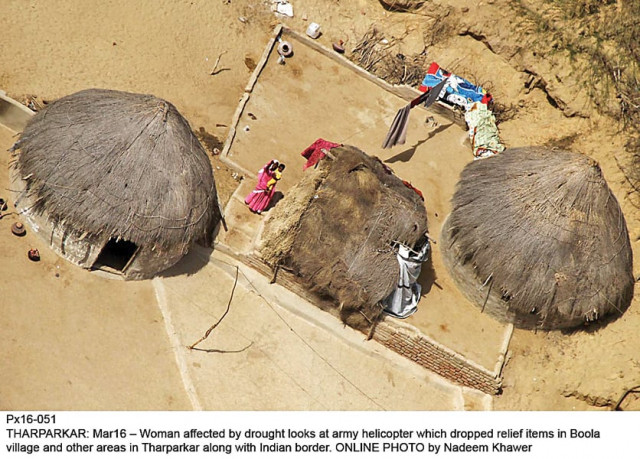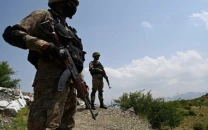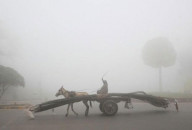Thar victims remain hungry amid claims of wheat hoarding by officials
Taj Haider promises long-term welfare for new mothers and their children.

Women living in drought-hit Tharparkar watch as the army helicopter drops relief items in Boola village along the Indian border. PHOTO: ONLINE
In two separate raids on Sunday, the Sindh High Court’s (SHC) monitoring committee’s in-charge, district and sessions judge Fayyaz Rabbani, recovered 50-kilogramme wheat bags. Rabbani recovered 150 hidden bags of 50kg each from a depot in Bajeer Muhalla. The judge ordered the registration of an FIR against the depot in-charge, Dilip Lohano, and directed the police to immediately produce him before the court.

At a separate godown, Rabbani found 180 bags stocked as records showed 220 bags in storage, while there were actually 400 bags. “The people of Thar are in desperate need of food and water but the administration has emptied all its godowns of wheat and are now making tall claims about relief measures,” the judge said while talking to the media.
Where’s the wheat?
The provincial government initially set aside 60,000 subsidised wheat bags for the famine-affected families under the distribution formula of one bag for each family at the price of 50 per cent the market rate. The supplies were doubled to 120,000 bags last week.
However, earlier this week, the government revised the district’s estimated population to 259,945 families and announced wheat bags for all of them.
“The remaining families will be given wheat bags within the next ten days,” promised Taj Haider, the Pakistan Peoples Party’s provincial general secretary, who has been made the relief coordinator. Haider told the media in Mithi that the distribution process would resume within 48 hours. According to Haider, so far 146,000 families have been given wheat bags.
However, food department officials claim that the supply of over 100,000 wheat bags has been stopped. “The food department is procuring wheat for itself as the harvest season is under way,” said a department official. “The supplies for Tharparkar will resume once the necessary procurement has been done.”
A line of patients
Meanwhile, six more children were admitted to the paediatrics ward in Civil Hospital, Mithi, where 78 children are already receiving medical treatment. The ward’s 20 beds were doubled to 40 last week as part of the emergency healthcare measures. Tacitly acknowledging the poor health of mothers as well as of children, Haider promised long-term support for them at a meeting on Sunday with local activists of non-governmental organisations. “Pregnant women will be given financial help and nutritious food,” promised Haider. “The Sindh government will also provide free nutritious food to every newborn for a period of two years.”
Relief attempts continue
Despite the wheat-hoarding controversy, relief distribution from the government and private organisations continues, with the military using their helicopters to drop food items to villages not accessible by road. On Saturday, 7,500 ration bags containing flour, rice, pulses, cooking oil and other essential edibles were dropped in Diplo taluka’s border regions of Bola and Mehrano.
Hafiz Abdur Rauf who heads the Falah-i-Insaniat Foundation (FIF) — the humanitarian relief wing of Jamatud Dawa — has appealed to all religious groups working for relief in Tharparkar to not discriminate between religions. The FIF has set up 60 medical camps in Mithi, Diplo, Islamkot and Nangarparkar. More than 13,000 people have been given health care services at these camps. The foundation is also providing free meals, three times a day, at all the government hospitals in the district.
Published in The Express Tribune, March 17th, 2014.



















COMMENTS
Comments are moderated and generally will be posted if they are on-topic and not abusive.
For more information, please see our Comments FAQ